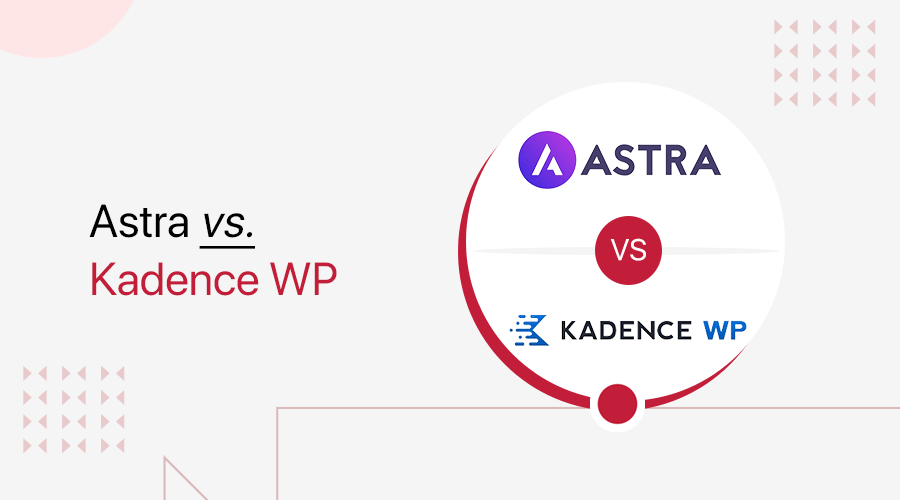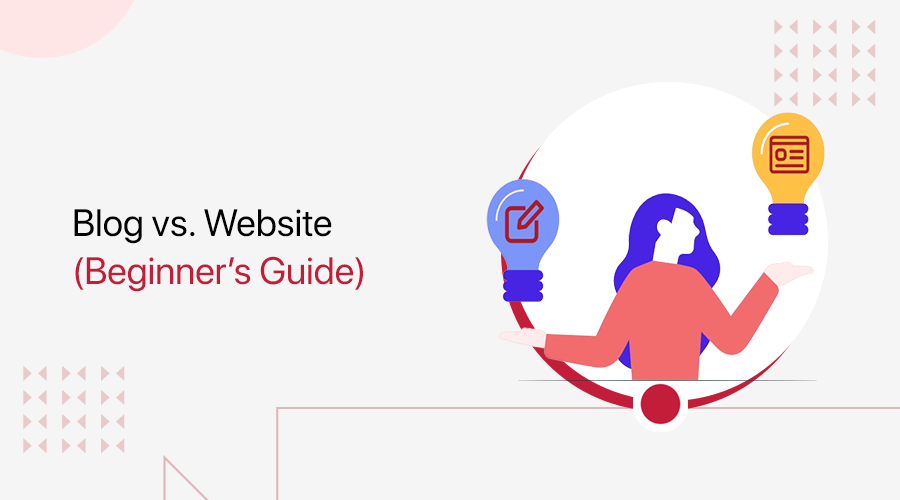
Do you want to know what’s the difference between ‘blog vs website‘? Don’t worry! We’ll compare the blog vs website in detail here.
If you are thinking of establishing an online presence, then you might be looking forward to creating a website or a blog. Choosing between them can get quite confusing as it is very common to confuse blogs and websites with each other. But they are quite different.
In this article, that’s exactly what we’ll tackle. We’ll be comparing ‘blog vs website‘ and list their features to explain how they differentiate from each other. We hope to help you make a good decision and choose the best one for you.
Now let’s get started!
Video Tutorial: Blog vs Website – Difference Between Blog and Website
Would you prefer to watch a tutorial video on YouTube instead? It’s right here!
Meanwhile, if you still prefer reading comprehensive post, then read all the way to the bottom.
A) Introduction – Blog vs Website
First of all, let’s know what a blog and website are. So, have a look at the brief introduction to them.
What is a Website?
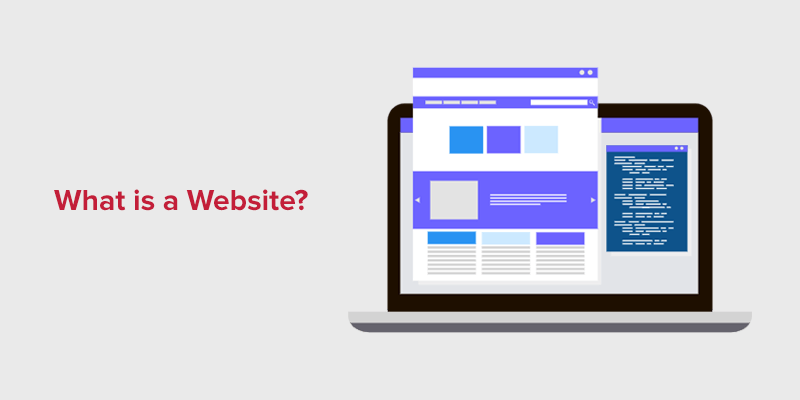
A website, as the name suggests, is a ‘site’ on the ‘web’ where you store information and details about your brand, business, or organization. Similar to a physical place, it’s a place on the web where you can store information for people on the internet to access.
Technically, a website is a collection of interlinked web pages grouped together which can be accessed by a unique address called the web address.
The web address looks like www.SiteNerdy.com which is a web address for our site. You can easily add information about the products and services you provide or market your business through these websites.
Basically, everywhere you navigate from your browser will take you to some kind of website. Facebook, YouTube, Twitter, and even Google, are all some types of websites on the web.
Types of Websites with Examples
Every site is based on a specific niche and a certain purpose. Because of that, websites can be categorized according to some of their similar functionalities.
If you want to build a site, then the first thing to do is select the type of site. To help you with that, let’s look into some popular types of websites.
1. Personal Website
Personal websites allow individuals to share their personal thoughts, skills, and stories. Like an online diary, you can share content on any topic on your personal site. And usually, it contains portfolios, videos, and image galleries for creating attractive content.
Check out some of the popular personal website examples below for more clarity:

2. Business Website
A business website represents the brand of a business organization online. Normally, it gives information about the company, its goods or services, and ways to promote them. This helps the company to easily build up a connection with its customers and makes a strong online presence for the business.
Thus, if you run a business, then to boost your brand, then you should create a business site. Now, have a look at some of the best business site examples:
- The New York Times Company (Newspaper business)
- Forbes (Business news and blog website)
- Microsoft (Technology business)

3. eCommerce Website
An eCommerce website is a popular type of business site to buy and sell products online. You can either run a single business by selling your products on your eCommerce site. Or allow multiple other vendors to also sell their products on your marketplace.
You may have come across several eCommerce sites before. Here, we provide you with some famous eCommerce sites to check out:
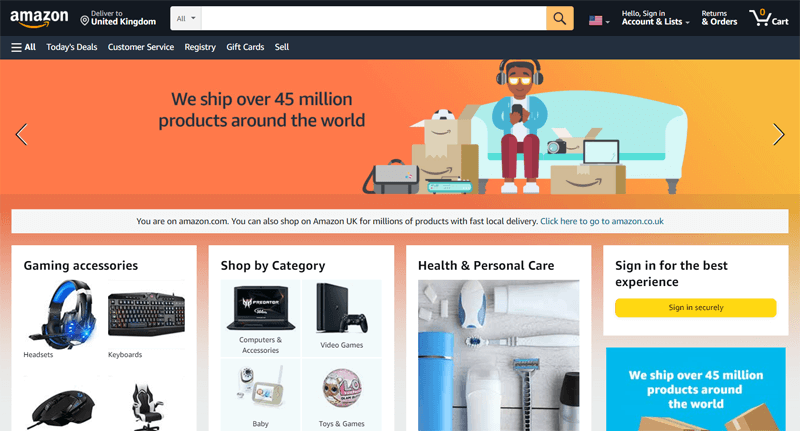
Moreover, look into our top list of the best eCommerce platforms to start your site. Also, check out our blog on the best multivendor eCommerce platforms if you want to build a marketplace.
You can check our article on how long does it take build an eCommerce website.
4. Online Course Website
An online course or LMS (Learning Management System) website is a popular type of membership site that offers online education. Here, the courses are given to the members of the website. That can be based on a single topic or multiple topics.
Do you want to build your dream online course site and inspire people to learn online? If yes, then it’s best to choose the WordPress platform. It comes with multiple WordPress LMS plugins and LMS themes to help you start.
Some of the best examples of an online course site are:

Check out our article on the most popular online course websites to know more examples.
These are just a few types of websites on the web. Several others come under this list. So, you can check them out in our article on the most popular types of websites.
Further, look into our top list of the 110+ WordPress website examples for better clarity.
What is a Blog?

Short of a weblog, a blog is an online journal that covers different topics by an individual writer or a group of people. These writers frequently add new content and constantly update new information to the blog.
These contents that you add to a blog are known as blog posts. Blog posts are the articles or information written by bloggers which also include images, videos, and gifs. These videos and images make blogs interesting and interactive.
Note that, the latest posts are arranged the first followed by the older blog posts in a blog.
People use blogs to share information, entertain people, and use them as a creative playground. Blogs help to create constant and powerful interaction with the visitors. Therefore, many businesses and companies are also establishing blogs to get the most benefit.
Types of Blogs with Examples
Similarly, a blog can also be of multiple types. Here, we provide you with a list of the most common types of blogs that you can find. So, let’s go!
1. Personal Blog
A personal blog is a blog where you write articles about a combination of topics of your interest. You can share your daily life routine, experiences, and adventures. Or write about your views or ideas. Make sure to add images, videos, and content for the site to look unique.
Further, personal blogs can be both entertaining and inspirational. Some of the inspiring blog examples you should check out:
- The Everywhereist
- GatesNotes (Personal blog of Bill Gates)
- Minimalist Baker

Do you want to collect your moments and ideas plus earn some extra money? Then, building a personal blog is the perfect choice for you.
2. Business Blog
A business blog is a part of a company’s site that supports its business growth and online presence. It includes articles on the company’s history, success stories, products/services, etc. Plus, sharing blogs on social media platforms also helps you to connect with existing and new users.
Note that, you can create a business blog even if you don’t run a business. Therefore, if you’re interested in creating a business blog, then it’s best to start it right now! Some of the amazing business blog examples are:

3. Fashion Blog
The fashion industry is getting huge and more popular nowadays. So, in a fashion blog, you can find about the fashion industry, clothing, and style. It also contains information about the latest runway trends, pictures of people (even you) wearing the latest clothing, etc.
Suppose you want to grow as a passionate fashionista and share your unique styling ideas. Then, it’s even great to run a fashion blog and get the recognition you want. With that, let’s look at some of the famous fashion blogs:

4. Health and Fitness Blog
Health is the most important thing in everyone’s life. So, people generally look at blogs that advise on a healthy lifestyle. Health and fitness blogs are exactly what those blogs are called. Here, you can share your advice, expertise, and information to help others to stay healthy.
Thus, if you’re health-conscious and want to share your health ideas, then this is the perfect blog. Here’s our article on the popular lifestyle blog examples to give you more references.
Let’s look at some of such inspirational health and fitness blogs:

There are other types of blogs also present on the web. You can have a look at them in our article on the popular types of blogs.
Now, let’s move ahead to the main section of our article. That’s the difference between ‘website and blog’.
B) Difference Between Website and Blog in Comparison Table

Now, if everything on the internet is sites, then the blogs should also be sites, right? Yes. Moreover, a blog itself is a type of website. This is getting confusing right? If they’re the same, then why do people talk about them as two different things?
However, they are not completely the same. As in, all blogs are sites but all sites are not blogs. To solve your confusion, we’ll show the difference between a blog and a website in a much simpler way.
Website vs Blog – Comparison Table
Here’s a side-by-side comparison table showing ‘blog vs website’.
| Parameters | Blog | Website |
| Definition | A blog is a website that mainly contains blog posts or articles as its major content. | A website has professional content on the web that generally includes multiple pages to denote products/services. |
| Frequency of Updates | Blogs have frequent latest posts on multiple topics. So, these sites are regularly updated and give dynamic content. | Websites are generally static portals with information on a specific topic. This means they are rarely updated unless they have a ‘blog’ included. |
| Pages | Blogs are interactive with frequent new posts on multiple topics. Because of that, there can be several blog pages on a blog. | Most websites have fewer pages in comparison to blogs. A business site has pages about the company, operations, and products/services. |
| Comments Section | Each blog post contains a comment section at the bottom of the page for users to share their ideas. | Instead of a commenting system, websites contain chat and contact forms for communication with the users. |
| Order of Content | The contents of a blog are arranged in reverse chronological order. It means that the most recent articles appear on the first page while the oldest articles are pushed behind. | There isn’t any specific arrangement of the content on a website. |
| Necessary Platforms or Modules | To build a blog, you need to select a blogging platform with dynamic content management features. For example, WordPress. | Based on the type of site, you need to choose a platform and multiple modules. For example, an online store requires an eCommerce platform with integration to payment gateways, etc. For example, WooCommerce, Shopify, etc. |
| Organizing Basis | Blog articles can be categorized based on categories and tags. | Websites use pages to organize and display the content. |
| Subscription | Users can subscribe to the RSS feed of a blog. | The subscription option isn’t present on the RSS feed of a site. |
That’s all for the comparison between a blog vs a website. With that, you now may be totally clear on the differences between blogs and websites. So, let’s move ahead!
C) Do You Need a Blog or Website for Business?
If you want to build a great online presence for your business, then you may have come across blog vs website dilemmas. And it’s important to figure out which is more suited for your business.
Many businesses already have typical sites on the web but they lack blogs. Sites are indeed crucial to establishing an online presence and providing information about your company and products.
Further, it also makes you more professional as about 84% of people think that a website makes a business more credible and trustworthy. And that’s according to the 2015 online survey by Verisign.
But you will miss out on many different features that blogs provide.
Can You Have Both a Website and Blog in One?
If blogs are so advantageous, then you may want to create one for your business. But you may be thinking that it’s hard to create/manage a site and a blog for your business separately.
However, this isn’t a problem at all. Because it’s not even necessary to choose between a blog versus a website.

Did you know that you can have both a website and blog in one? Yes, you heard it right.
You can easily create a website for your business with CMS platforms like WordPress. This includes some static pages such as an about page, services page, etc.
Along with that, you can add a blog page. And WordPress allows you to easily integrate your blogs to your site. So, you can get the best out of both worlds pretty easily.
Now, let’s take some examples of some businesses that have recognized the importance of integrating blogs into their sites.
Rank Math is a popular website that gives SEO (Search Engine Optimization) tools for WordPress. You can find various pages on this site like features, pricing, etc.
Along with that, there’s a blog page also present. There, you can view the blog posts by the company sharing the tips and guides on using those SEO tools.
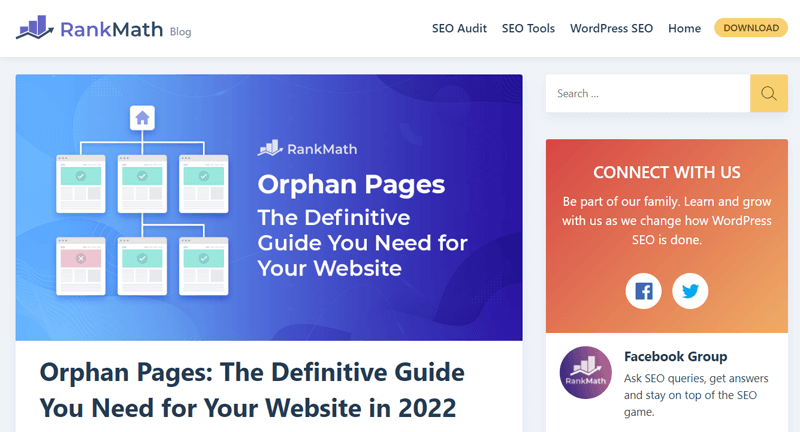
Similarly, Template Sell is another business site that contains both a website and a blog. With that, it can achieve the best results and growth of its business.
Therefore, you can also consider doing the same for your business if you want to grow at a faster pace.
Why is a Business Blog Important for Your Business Website?
We’ve been telling you that a blog is very helpful for any business. Now, it’s time to look at the importance of a business blog on a business site. That’ll justify why you need a blog for your site!
- A blog is much more interactive and acts as a communication platform that allows you to get feedback from the customers easily.
- You can keep your visitors updated with new information about your brand or company.
- Search engines also prefer blogs more than websites and try to show the latest content to the audience.
- According to a Hubspot article in 2017, a business with a blog tends to get 55% more visitors than a business with a static website.
- Blogs make it easy for you to promote and market your business on different social media platforms. That’s by providing different and unique articles for each share.
- Your posts are easily categorized and arranged according to the publish date.
Therefore, to know the importance of a website or blog, check out our article on why you need a website.
D) Blog vs Website – Which is Better to Make Money Online?

You might be wondering if monetizing your blogs and websites is possible. The simple answer to that would be ‘yes’. Blogs and websites have their pros and cons when it comes to making money online. But they both work perfectly fine to start and eventually generate some revenue.
It means both of them equally have merits and demerits when making money. Whichever site you choose, there are ways you can easily make money. So, some of the primary ways that you can make money off your site or blog are:
i. Placing Ads and Integration with Google AdSense.
You can display ads on your content or integrate with Google AdSense to display ads and make money off it. AdSense will find ads to display ads on the ads space of your content and send you payments according to the policy.
Thus, you can start making money off your site or blog after integration with Google AdSense.
ii. Selling your Products or Services
Another way to make money online is by selling products or services online or running an online shop. You can easily integrate eCommerce functionalities both on a website and a blog, to showcase and sell your products online.
In case you’re using WordPress, then add a WordPress eCommerce theme and WordPress eCommerce plugin to easily get started.
iii. Promoting Other Products or Affiliate Marketing
Affiliate marketing is promoting other companies or people’s products for a commission. An active blog or website can easily generate good revenue using affiliate marketing.
Both blogs or websites can generate good sums of money but it is natural for one of them to get the edge on the other. And, the blog is the one that takes the lead.
Here are some affiliate marketing themes to use when using the WordPress platform.
iv. Support Service after Purchase
You can give support and other services to your customers after they purchase your goods. With that, you can earn extra money.
Offering such services may not be the most sustainable way to build a big business from a blog. However, suppose several visitors or followers are interested in the expertise you provide. Then, in that case, providing a sales service can be very profitable.
v. Donations Portal
Using a donation portal on your site is another way of earning money online. You can find several website builders with different donation portal page templates to include in your site. You can also find themes for blogs that add donation portals for your visitors and customers to donate to you.
You can take the help of a WordPress donation plugin to do so. Moreover, here’s a guide to adding a donation form.
Blog or Website – Which is the Winner?
Both sites and blogs can use these methods to generate revenue. But the most crucial thing in getting a better result is organic traffic. Websites indeed generate good amounts of traffic, but they are not as long-term as blogs.
The more traffic your blogs or websites get, the more benefit you get from affiliate marketing, displaying ads, and selling your products. If you have a high number of constant traffic, then your site will grow at a faster pace.
This also helps you generate a good sum of money. And this is exactly what helps blogs to get the lead.

Blogs are very interactive with constantly new information about different topics. This causes visitors and readers to return to the blog time and again.
But that’s not the case for websites. If your blog is optimized properly for search engines, then you will rank higher in search engine results too. This helps the blog get more traffic and generate better revenue.
The interaction and constant traffic that blogs help generate, along with tons of different eCommerce features make the blog a better way to make money online.
E) Getting Started with Your Blog or Website
The process of making a blog or website is basically the same except for the resources you’ll need to use. To be more precise, the site-building process actually depends on which type of website you want to create. You know, blogs are also a type of website.
Here, we’ll talk about the steps and resources required to make a website in brief.
i. Choose a Platform for Your Website/ Blog
The first thing you need to make a website or blog is a platform or website software.
There is a wide variety of platforms that let you build websites and blogs. Some platforms like WordPress.org, Wix, etc. allow you to make all types of sites including blogs. Whereas some platforms like Blogger and Medium are specifically built for blogs.
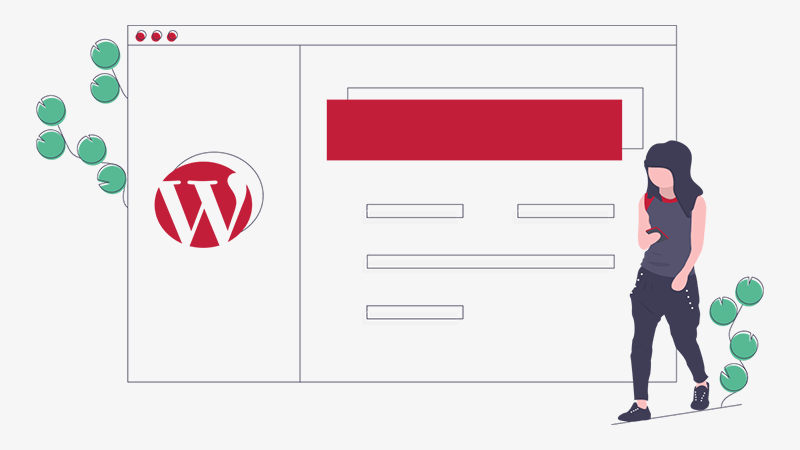
All these different platforms have their own set of features, pros, and cons. Which platform you should choose depends on which type of site you want to build.
But if you’re planning to make anything serious (website or blog) which looks professional, then we recommend you to choose WordPress.
WordPress Platform – Our Recommendation
WordPress is the most popular CMS and website builder tool on the web which controls over 42% of the website on the internet. This is a free open source platform that also allows you to easily create your site and integrate a blog on your website for free.
WordPress comes in 2 different flavors: WordPress.com and WordPress.org. What we’re referring to by ‘WordPress’ here is the self-hosted WordPress.org. For more information on them, you can check out our comparison of WordPress.org vs WordPress.com.
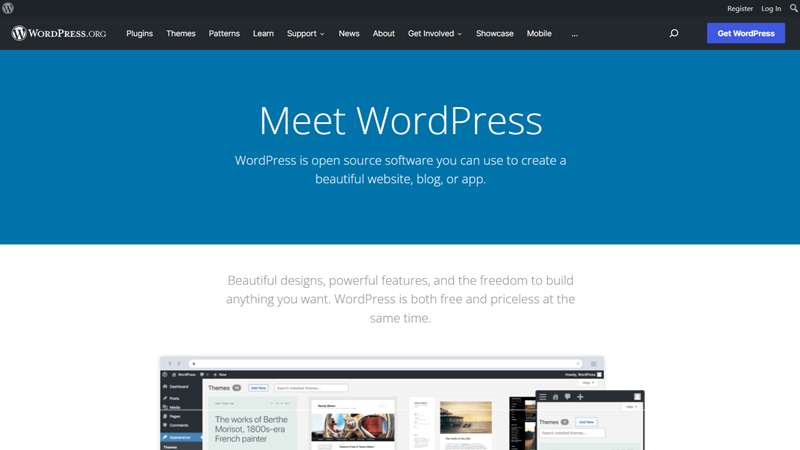
Here’s a list of some of the advantages you’ll receive when choosing WordPress as your blog or site platform.
- Creating a website/blog with WordPress.org is completely free.
- It’s a self-hosting platform. That means you can choose a hosting platform on your own. This saves your money since you can choose the one that meets your needs.
- Contains a large directory of free and premium WordPress themes and WordPress plugins. With that, you can have any functionality and design on your blog/site.
- Includes customization options to make your site/blog unique from others.
- Offers free support from WordPress experts across the globe.
If you’re researching on other platforms as well, then check out our comparison articles. Here are links to those articles for WordPress vs Weebly, Blogger, Wix, Ghost, etc.
ii. Add a Domain Name and Select a Web Hosting
After you choose your website builder, you need to look for a domain name and web host for your site/blog. So, let’s know what are they and how you can choose one to move forward!
What is a Domain Name? Which Domain Name Registrar Should You Choose?
A domain name is a name and the identity of your website. It is very important to get a unique domain name that represents your site. Different domain name registrars provide domain names at different pricing with different offers.
You need to choose the domain name according to what your site actually is about and it needs to reflect it. You should try to include your company and product name or part of the name for the domain name.
For example, the domain name of our blog site is SiteNerdy.com.

If you’re still in confusion, then you can use the domain name generators to decide on the domain name. They’ll provide a list of good domain names as per the keywords you search.
Whereas for searching the availability of the domain name and registering it, you need to use a domain name registrar. And there are many domain name registrars to help you with that.
Some of the ideal registrars for you to choose from are Name.com, Domain.com, etc.
What is a Web Host? Which Web Hosting Platform You Should Choose?
Hosting services provide you with a service to store the data of your website on their server. Hosting services provide you with different hosting options to choose from but you need to be cautious when selecting the best one for your site.
You can buy both a domain name and hosting from some top hosting companies like Bluehost and DreamHost. And, it’s also easy and cost-efficient if you purchase them both from one place.
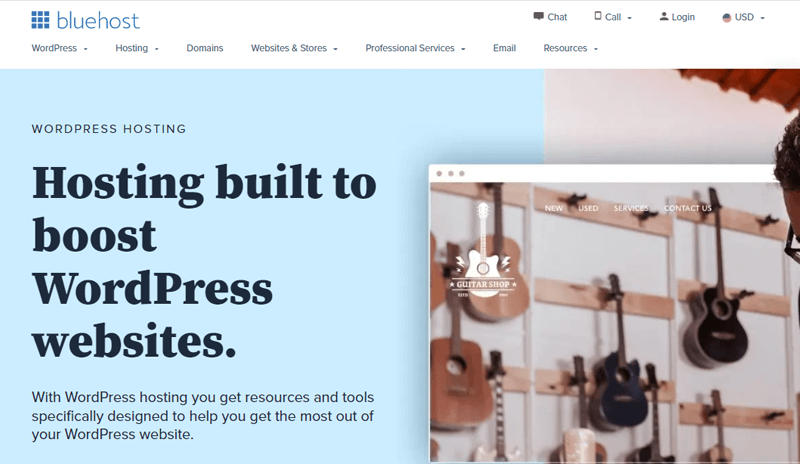
Some of our other recommendations on web hosts are Hostinger, Namecheap, Cloudways, and SiteGround.
Moreover, also make sure to check out some of the best web hosting platforms you should choose from. And for your blog, you can start with the cheapest WordPress hosting services.
If you’re still confused between a domain name and a web host, then here’s our complete comparison between them.
iii. Select a WordPress Theme
WordPress theme helps make your site elegant and attractive. This plays a huge role in attracting more traffic. So, it is important to go with a theme that works best for your site niche.
There are many different premium and free WordPress themes for different types of sites. Some of the best themes for WordPress are:
- Kadence – Multipurpose Theme
- Astra – Multipurpose Theme
- Avada – Business site Theme
- Typology – Blogging site Theme
- Uncode – Portfolio site Theme
- Oshine – Portfolio site Theme
If you’re confused about what to look for in a theme, then here’s our guide on how to choose a WordPress theme. Also, check our article on how to install a WordPress theme to get started.
iv. Use Recommended WordPress Plugins and Tools
It is important to have the best plugins for your WordPress site. A WordPress plugin when used will provide your site with added functionality and features to do much more. Some of the most crucial plugins for a site are:
- SEO plugins – Yoast SEO
- Backup Plugins – UpdraftPlus
- Security Plugins – Akismet
- Performance Plugins – WP Super Cache
- eCommerce Plugins – WooCommerce
Again in confusion to look for a plugin, then here’s our guide on how to choose a WordPress plugin. Also, make sure to have a glance at how to install a WordPress plugin to get started.
Moreover, we have a list of the popular and best WordPress plugins and tools for your blog. So, have a complete look at it.
These are the things you need to get started with blogs and websites alike. They have pretty much the same steps but mostly differ on how you present your content and what features you include. This differentiates your site from a typical ‘website’ and a ‘blog’.
Want to look at a full guide on creating a blog or a website? Then, check out our comprehensive guide on how to create a website and how to start a WordPress blog.
F) Blog vs Website – Which to Go for?
Choosing between a blog vs a website mainly depends on what your goal is and your requirement. Going with what exactly suits you and works the best for your organization or business is the important factor in choosing between a blog vs a website.
Here are some points that state when you can and cannot use a blog and a website. With that, you’ll be clear enough to choose between a blog vs a website. So, let’s see them.
i) When to Use a Blog?
- If you want to keep the content fresh and dynamic with regular updates.
- In case you want frequent interaction with your readers.
- To easily get feedback from your readers and maintain a close connection with them.
- When you want to create a simple website that you can handle yourself.
- For good organic traffic because search engines rank blogs higher with new content.
- Write articles on various topics of your interest or business to share.
ii) When to Not Use a Blog?
- If you can’t give new updates or articles.
- When you can’t moderate the comments on the blog.
- In case your writing isn’t that great.
iii) When to Use a Website?
- To show only the crucial information of your business like your products and services.
- When you want a site with consistent content and no frequent updates.
- If you need a professional look for your business.
- For easier maintenance.
- You aren’t clear about content marketing.
iv) When to Not Use a Website?
- If you want more visitors attracted to your site.
- When you need high organic traffic to your site.
- In case you want your site to rank higher. As crawlers don’t crawl sites more often.
But you don’t actually have to choose between both. As we mentioned before, you can easily have both at the same time. Many website owners are already integrating blogs into their sites to get the best features of both.
And, if you are unsure about what to choose, then we suggest the same too. Even if a blog requires frequent updates and posts, integrating a blog into your website is the best option.
G) FAQs (Frequently Asked Questions) on Blog vs Website
1. What’s the main difference between a blog and a website?
2. How is a blog post different from a page?
3. Can I use a blog for my business?
4. Is it possible to sell on my website/blog?
Moreover, there are other eCommerce platforms like Wix and Shopify that enable you to immediately create your online store.
5. How do bloggers make money?
Conclusion
You should know what a blog is and how it is different from a website with this detailed comparison of ‘blog vs website‘. Now, you can choose the best for you according to your goal and requirement.
You can start creating your website or blog and we wish you the best on your journey. Also, read our other comparison articles like blog vs newsletter and content marketing vs SEO.
We hope this article helped you to learn about blogs and websites, and also differentiate between them.

